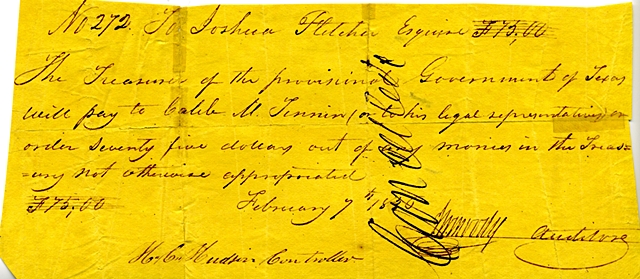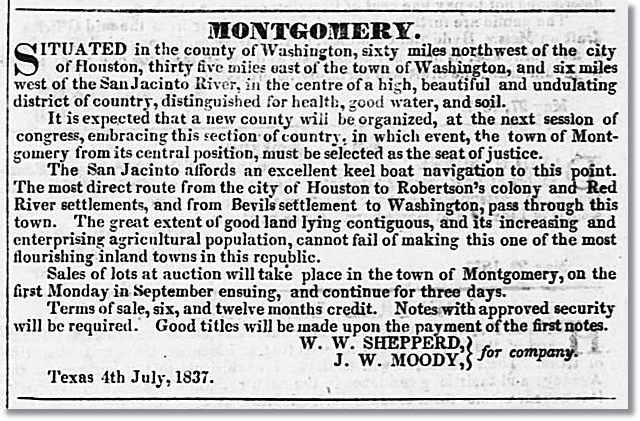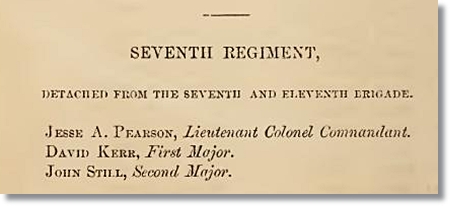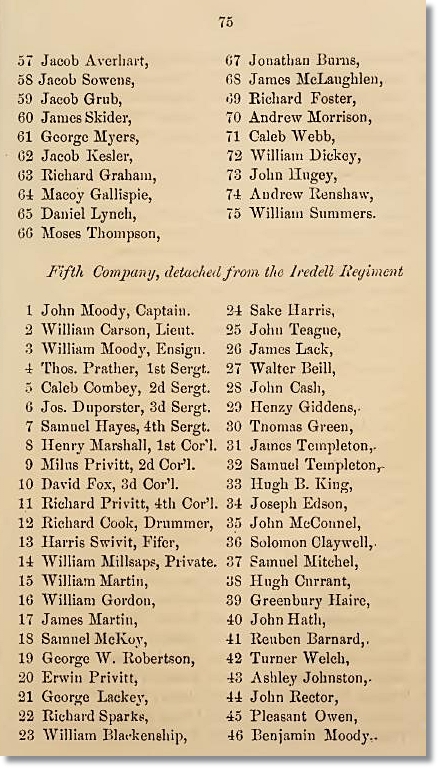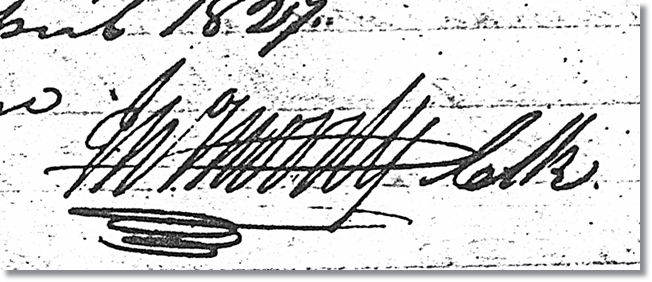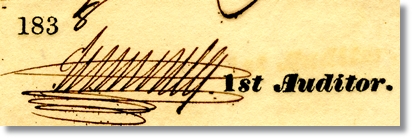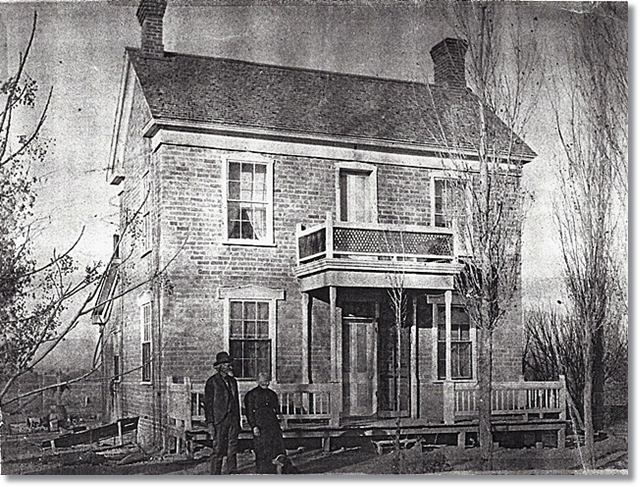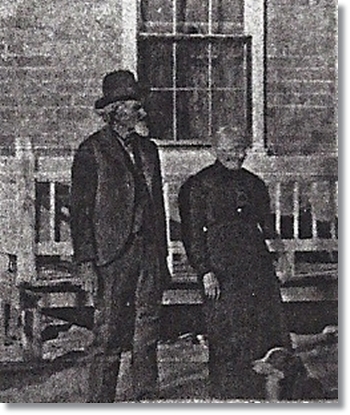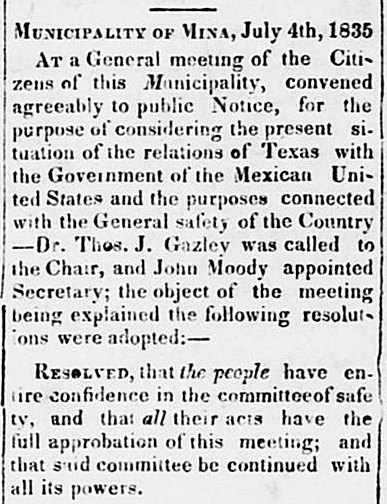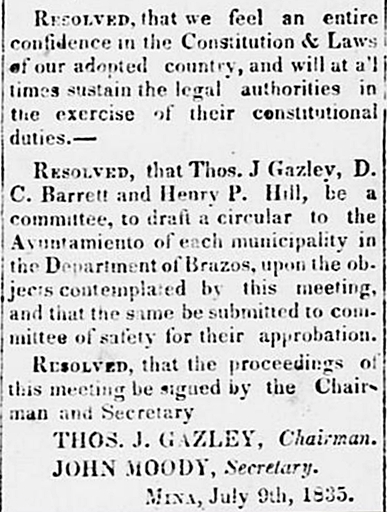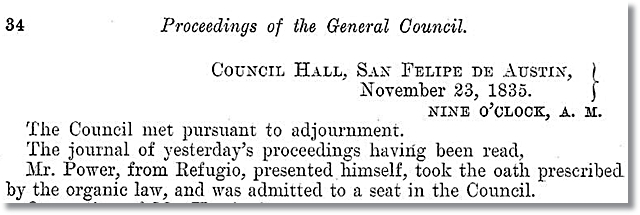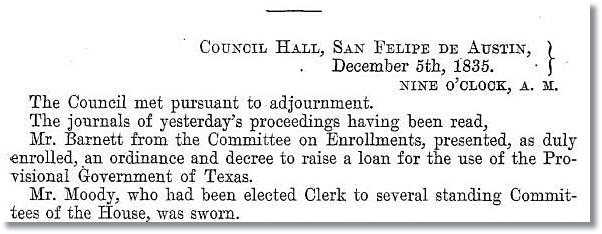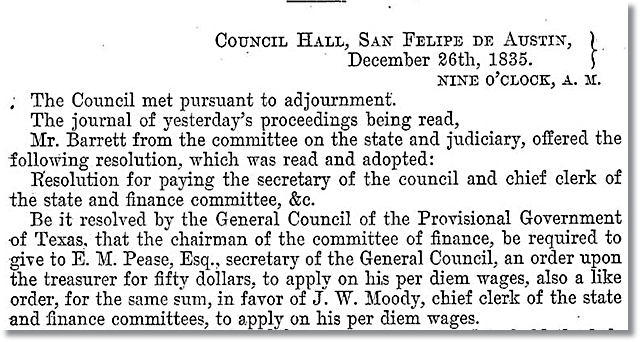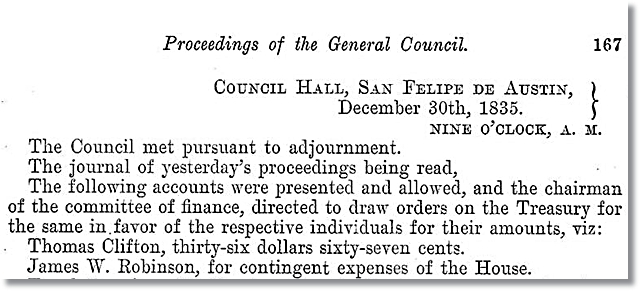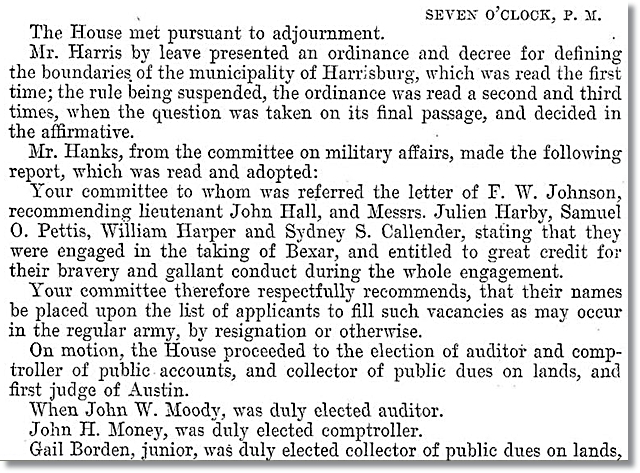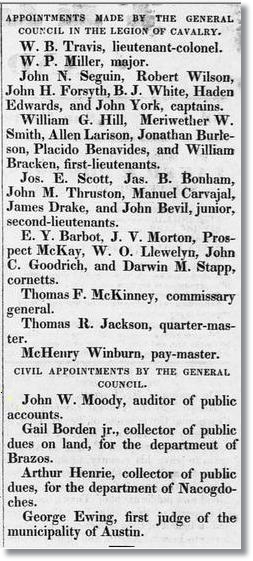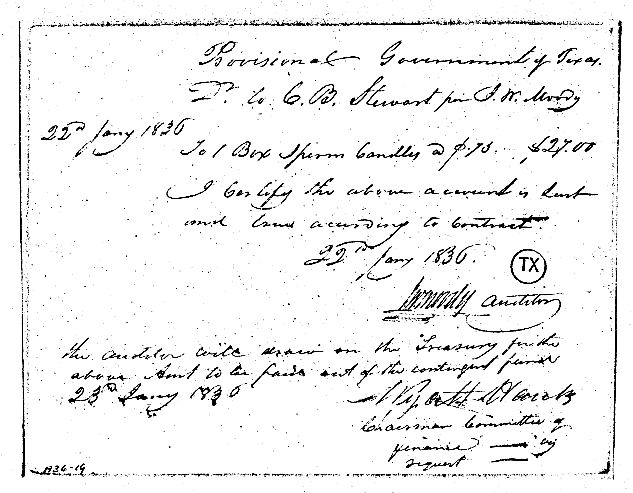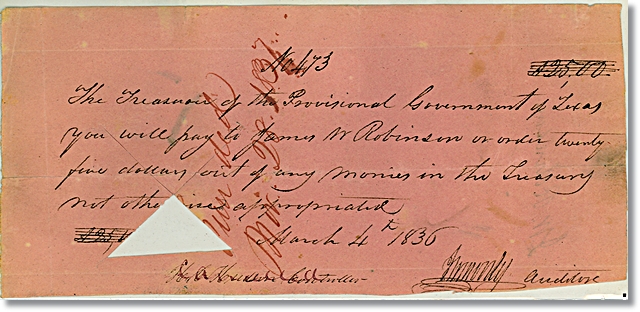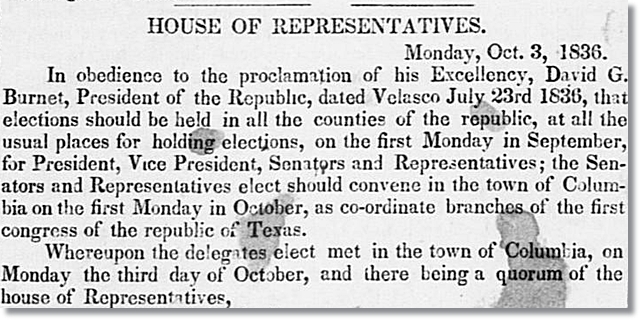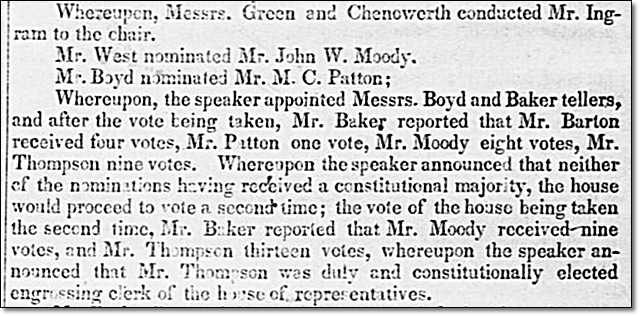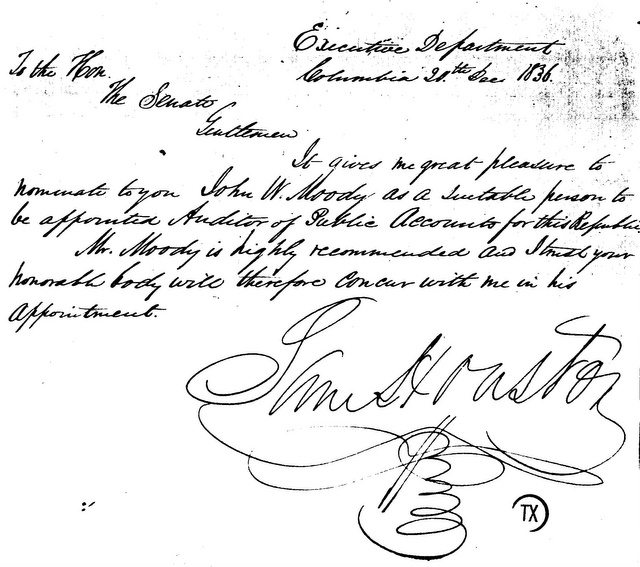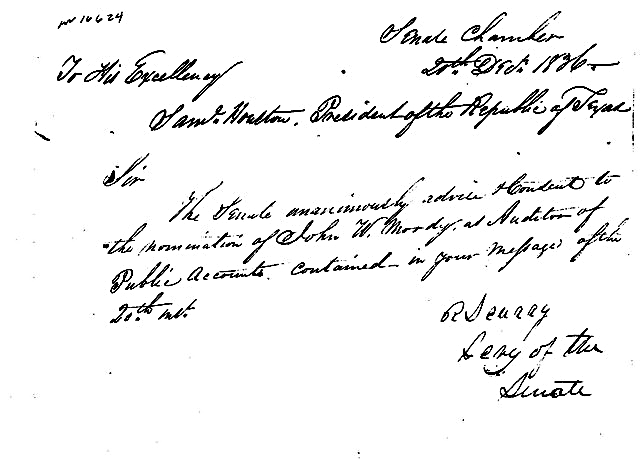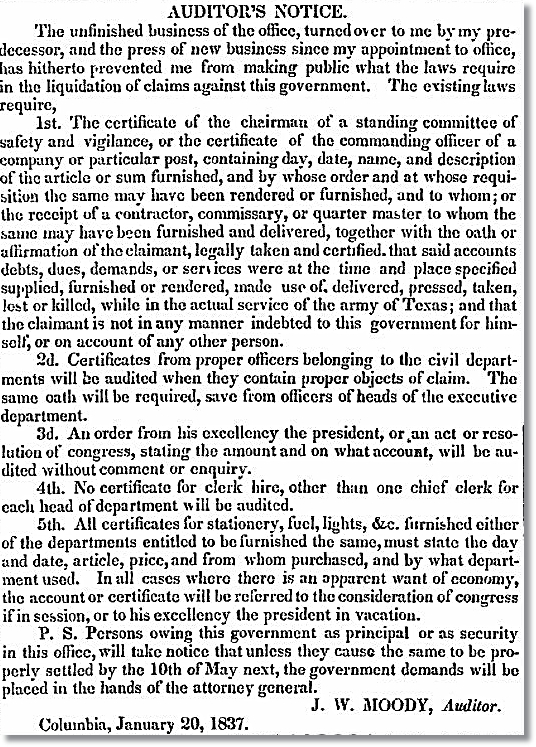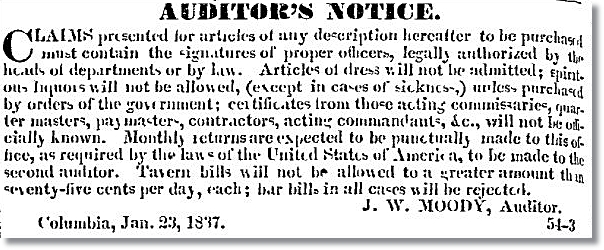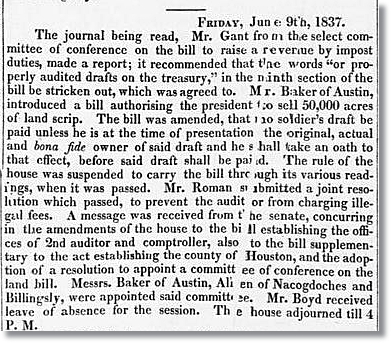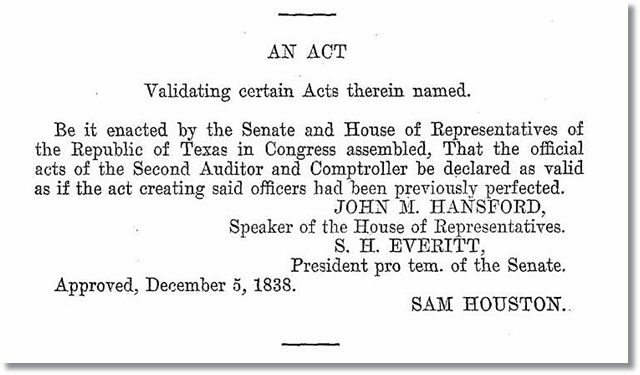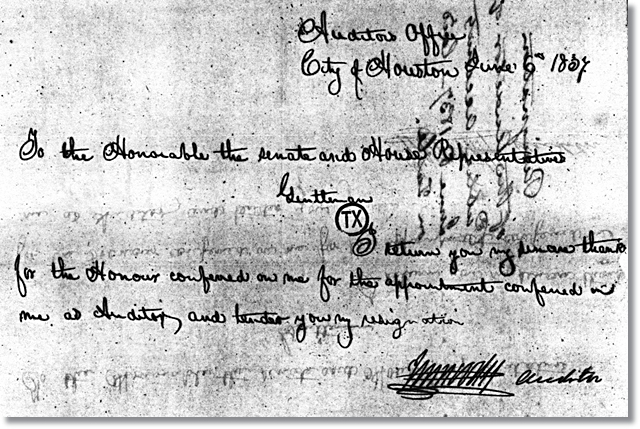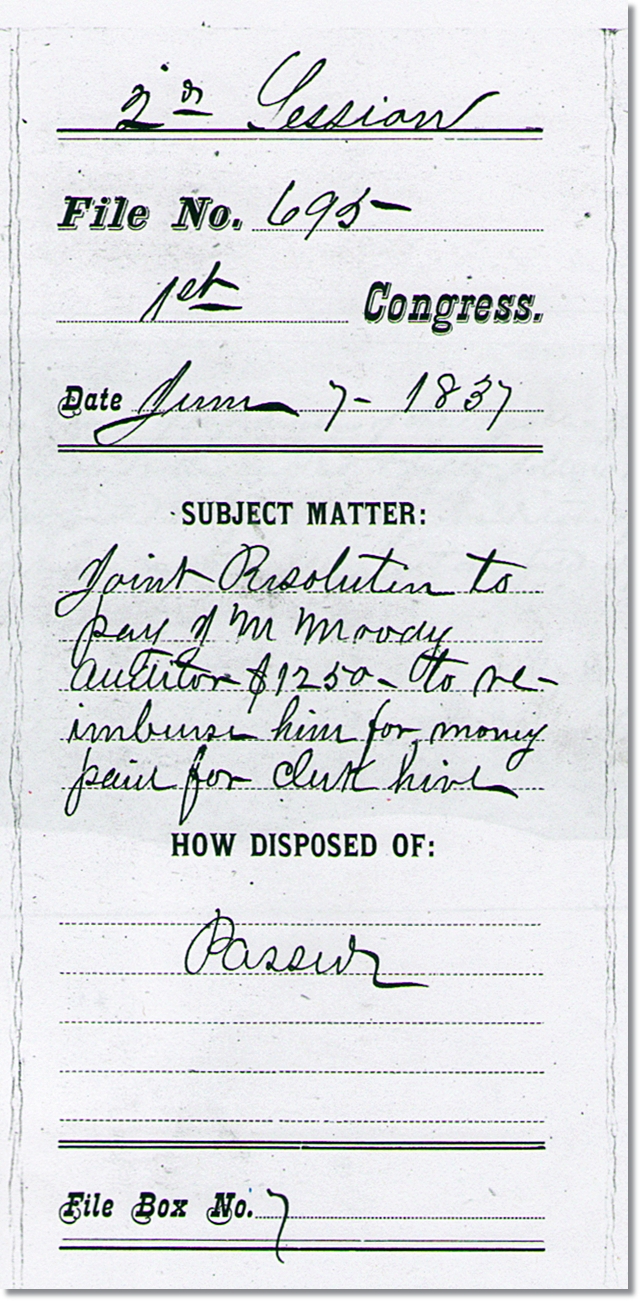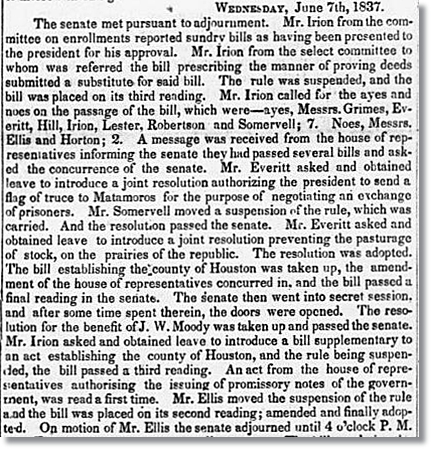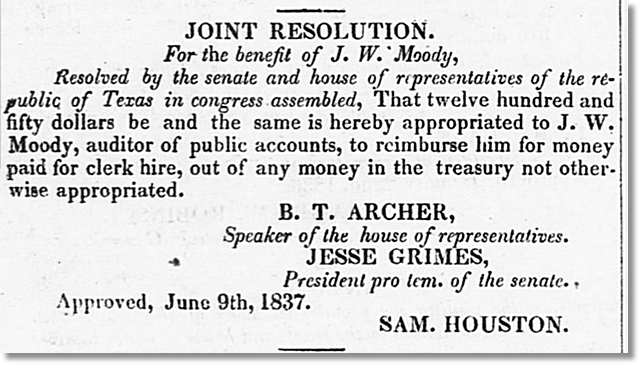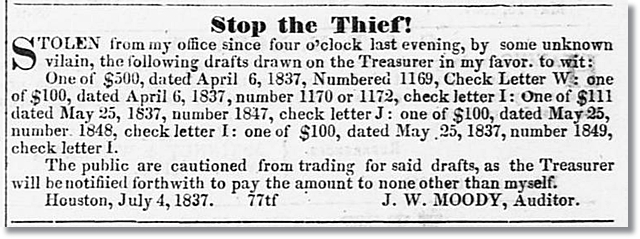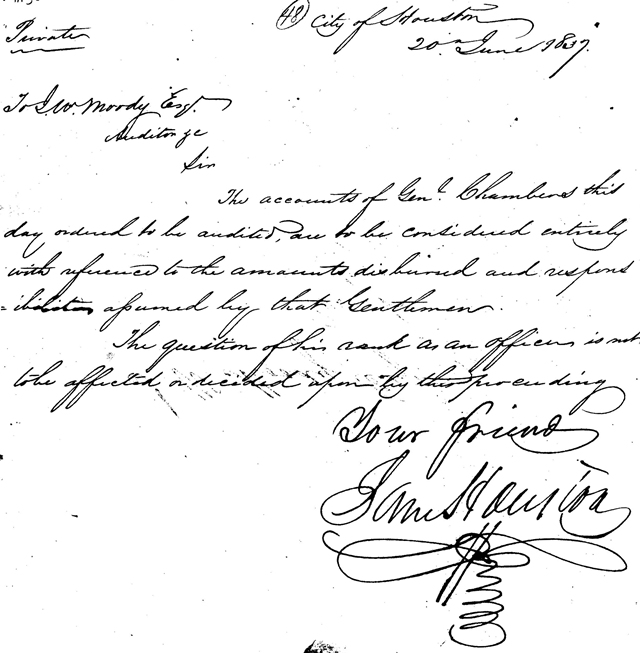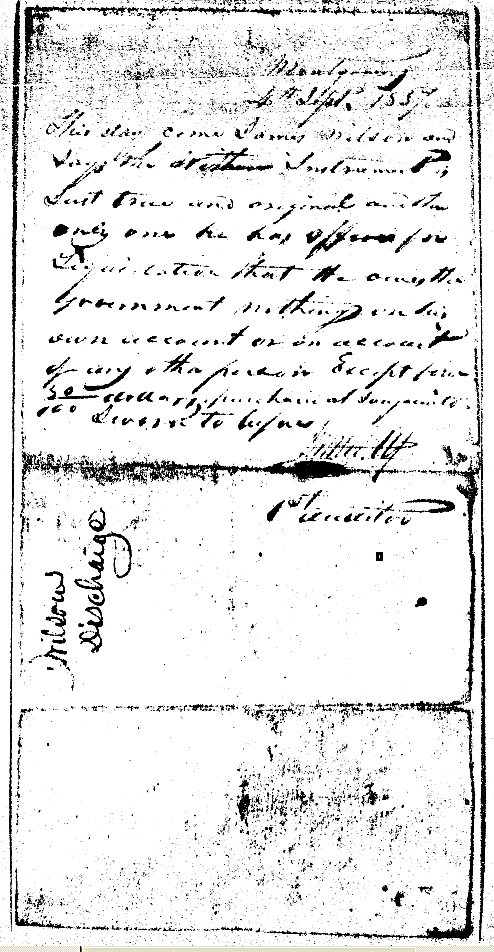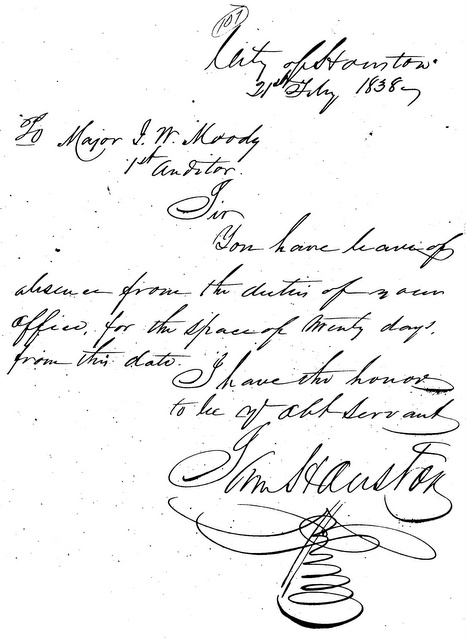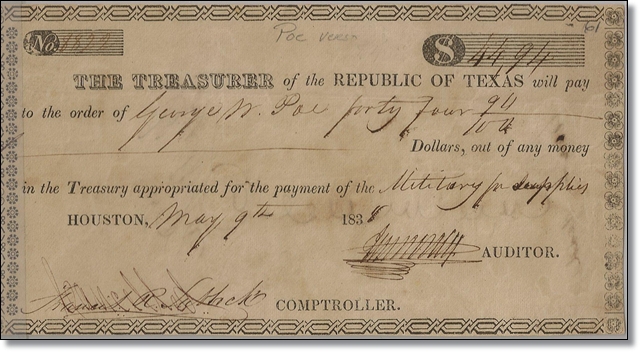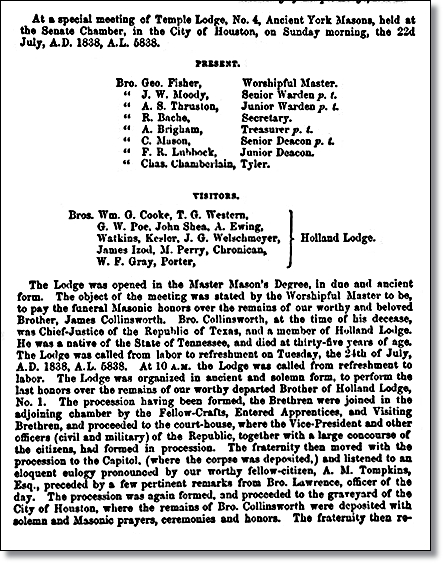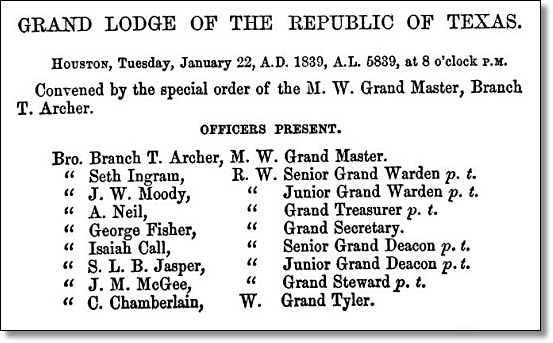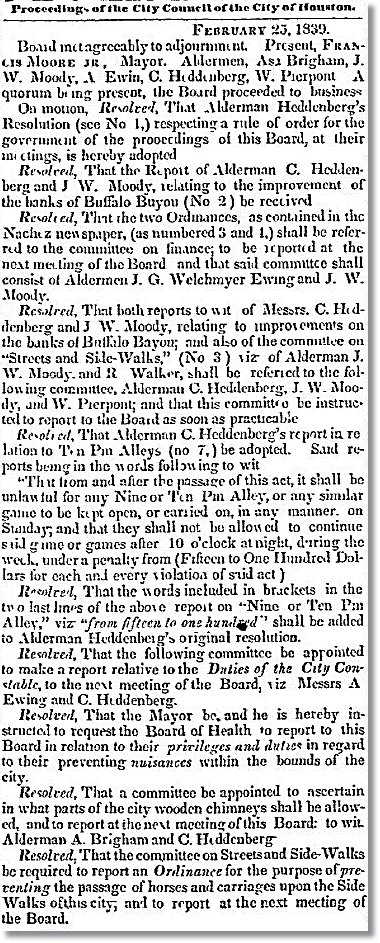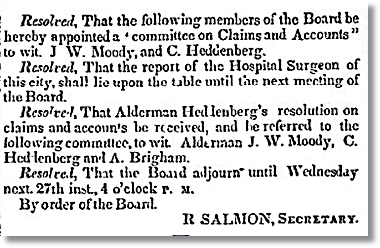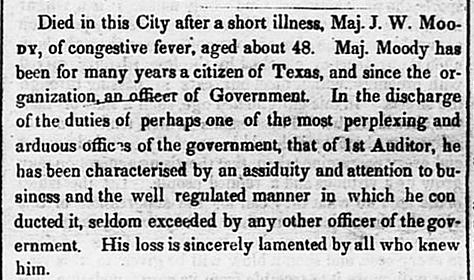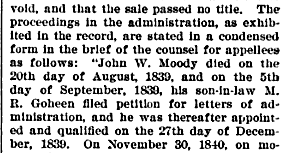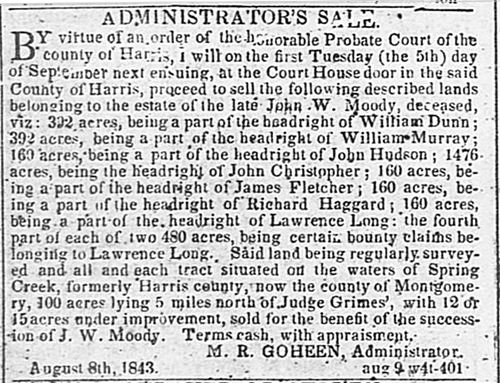
John Wyatt MoodyandThe Founding of the Town of MontgomeryTexas in July, 1837With an Emphasis on John Wyatt Moody's Crucial Role in the Naming of the Town of Montgomery and Montgomery County, Texas (From: The Early History of Montgomery County, Texas)by: Kameron Searle
This is an example of a draft signed by J. W. Moody as Auditor of the Provisional Government of Texas on February 7, 1836. This image is from a private collection. James P. Bevill, the author of The Paper Republic has kindly authorized the use of this and other images of documents signed by J.W. Moody in this article.
John Wyatt Moody Originally, J. W. Moody was a mystery. I had no idea who he was. Surprisingly, he was not even a resident of the Lake Creek Settlement. In solving the mystery of who J. W. Moody was, I finally solved the puzzle of where the name of the town of Montgomery and the County of Montgomery, Texas came from. This research has also resulted in the most complete monograph ever written about John Wyatt Moody and his many activities during the early Republic of Texas.
On this page, I will begin to outline some of my research regarding Major John Wyatt Moody, who was the business partner of W. W. Shepperd in the founding of the town of Montgomery, Texas in July 1837. I will begin this article with an outline of the life of J. W. Moody and begin filling it out over the next few months with documents and other research that I have discovered over the last ten years while researching the Lake Creek Settlement and the Founding of the Town of Montgomery, Texas. Some information will be provided as to Moody's early life, but this biography will focus primarily on Moody's life, career and influence in Texas.
Why is J. W. Moody so important to a study of the early history of Montgomery County? Because, it would be the influence of J. W. Moody that decided the name of the town of Montgomery and the County of Montgomery. As will be seen, John W. Moody, would be one of the two men who named the town of Montgomery, Texas. It will also be shown that Moody played a key role in the creation of Montgomery County. The biography of J. W. Moody is essential to an understanding of the source of the name of both the town of Montgomery and the county of Montgomery. The key to understanding the historical mystery surrounding the naming of the town and county of Montgomery is J. W. Moody. Because Moody resided in Houston and died within a year and a half of the creation of the new county, his role in the history of Montgomery County was quickly forgotten. W. W. Shepperd would sell out his interest in the Town of Montgomery to James McCown in October of 1839 shortly after the death of Moody. Shepperd would move on to other land speculation projects and die just ten years later in 1849. His role in the founding of the town would be all but forgotten quickly as well. The truth about the founding and naming of the town and county of Montgomery would be replaced over time by the romantic Montgomery Trading Post Myth. The Montgomery Trading Post Myth filled the needs of later generations to understand where the name of the town and county came from. It did not matter that there were as many different versions of the Montgomery Trading Post story as there were historians or that there was no evidence to support the existence of the so called Montgomery Trading Post. All that mattered was that it explained some important things about the early history of Montgomery County that people wanted to know the answers to. And no one seems to have cared that the Montgomery Trading Post myth did not match any of the primary historical records found in the Montgomery County courthouse, the Washington County courthouse, the Austin County courthouse, the Grimes County courthouse, the Texas State Library and Archive, the Texas General Land Office, etc. Click here for more detailed information on the Evolution of the Montgomery Trading Post Myth and the evidence which has been located in recent years that proves conclusively that the Montgomery Trading Post Myth is not true. If you would like to contribute information to this article, see the Help Wanted section below. The article is a bit bare bones right now, but it will be fleshed out very shortly. At this time, click here to see the most complete biography of John Wyatt Moody currently posted on the Internet. Click here to see more on John Wyatt Moody's land dealings in Houston during the Republic of Texas. As researchers will search for Moody in different ways on Internet search engines, his name is spelled three different ways throughout the article: J. W. Moody, John W. Moody and John Wyatt Moody. His military rank of Major is provided a number of times for the same reason.
Genealogy of John Wyatt Moody There are a number of genealogies available on the Internet for the family of John Wyatt Moody and it is not the purpose of this page, at this time, to explore his ancestors and many descendants. It would be welcomed if a descendant of John Wyatt Moody were to prepare a well researched genealogy for the Texas History Page to publish. A number of descendants have contacted me and have been very helpful with historical details of the life of J. W. Moody, but none has provided a modern or in-depth family genealogy yet. According to a number of sources, John W. Moody was born in Lunenburg, Virginia in 1776. Janice McAlpine, a genealogist who has researched the Moody family, advises that John Wyatt Moody probably wasn't born in 1776. McAlpine writes, "For example, John Wyatt [Moody] wasn't born in 1776. His father Dr. Thomas Moody was born 9 November 1759 (pension file, family bible and gravestone). Dr. Moody [John Wyatt Moody's father] first appeared in his own father's household on the tax rolls in June 1776, at age 16. So I doubt he was married at age 15 and a father at age 16." John Wyatt Moody married Mary "Polly" Baldwin.
Major John Wyatt Moody Where John Wyatt Moody received the military rank of Major has proved elusive, but it is now known that John Moody served in the War of 1812 as a Captain. During the War of 1812, Moody served as Captain of the Seventh Regiment of the Fifth Company detached from the Iredell [County, North Carolina] Regiment. See "The Muster Rolls of the Soldiers of the War of 1812 Detached from the Militia of North Carolina, in 1812 and 1814"
See the Muster Rolls of Soldiers of the War of 1812: Detached from the Militia of North Carolina in 1812 and 1814. Published in pursuance of the Resolutions of the General Assembly of January 28, 1851 and Resoulution of the General Assembly of February 25, 1873 by North Carolina, Adjutant General, pages 70 and 75. It is also important to note that two of John Wyatt Moody's brothers, Benjamin Epps Moody born December 17, 1786 and William Moody born March 10, 1794 were also in his unit. William Moody was also an officer in the unit. He was Ensign of the unit. Benjamin Epps Moody was a private. I would like to thank Cindy Moody Justice for locating this important information regarding the Moody family's military activities during the War of 1812.
John W. Moody, Jailer of Montgomery County, Alabama By the early 1820's, John Wyatt Moody had moved to Montgomery County, Alabama. Prior to serving as the County Clerk of Montgomery County, Alabama, John W. Moody had served as the Montgomery County Jailer. This is reflected in a number of documents. In the 1825 House Journal of the Alabama General Assembly, it provides the following information for Thursday, November 24, 1825 on page 19: Thursday, November 24, 1825
Special thanks to Jon Moody, a descendant of John Wyatt Moody, for helping to locate this record.
John W. Moody, County Clerk of Montgomery County, Alabama We are very fortunate that John Wyatt Moody had such a distinctive and unusual signature. Typically, though not always, Moody drew a loop through the body of his signature. This loop begins on the left and goes to the right and finishes on the left. He also drew a loop under the length of his signature with three more smaller loops under this "underlining" loop. The three smaller loops are drawn under the left side of his signature.
Dec d. See Montgomery County, Alabama, Records of Estates Vol. 2, p. 67. His signature has allowed us to follow him from his office as the County Clerk of the County Court of Montgomery County, Alabama to the office of Auditor of the Republic of Texas. Below is Moody's signature from a document he signed as the Montgomery County Clerk in April of 1827.
Below is Moody's signature from a Republic of Texas document he signed as First auditor of the Republic of Texas in June of 1838 eleven years later.
This image is from a private collection. James P. Bevill, the author of The Paper Republic has kindly authorized the use of this and other images of documents signed by J.W. Moody in this article.
John W. Moody Arrives in Texas in 1835 In the records of the Harrisburg County (now Harris County) Land Commissioners we find that J. W. Moody applied for a league and labor of land in January 1838. His son, William C. Moody, applied for a labor of land at the same time. His application is also informative.
J. W. Moody's land claim was approved by the Office of Land Commissioners for the County of Harrisburg, Republic of Texas, on January 25, 1838. It is obvious that Moody was in Texas by May of 1835. As we will see below, in his son's claim, J. W. Moody was in Texas by April 11, 1835. Note: The witnesses who swore to J. W. Moody's presence and citzenship in Texas before Texas independence, were George Washington Poe and James Clinton Neill. Both of these gentlemen had had extremely important roles in the Texas Revolution. J. C. Neill had distinguished himself in the Siege of Bexar. Neill was the commander of the Alamo. Not expecting Santa Anna to arrive as soon as he did, Neill was the officer who left William Barrett Travis in temporary command of the Alamo so that he could go care for his family which had been stricken with a serious illness. Neill was riding back to the Alamo when the Alamo fell. Neill was commander of the Twin Sisters (the two Texas 6 pound cannons) at San Jacinto on April 20, 1836 and received a severe wound to his hip. J. C. Neill's own land claim was approved by Land Commissioners of the County of Harrisburg the the same day (January 25, 1838) as J. W. Moody's. According to a number of sources, J. C. Neill had moved to Mina (later Bastrop, Texas) on the Colorado River in 1834.
J. W. Moody in Texas by April 11, 1835 J. W. Moody was in Texas by April 11, 1835. William C. Moody was a son of J. W. Moody. William C. Moody made his claim for land on the same day immediately after his father (January 25, 1838) in Harrisburg County. J. W. Moody's claim was number 228, and W. C. Moody's claim was number 229. In the record of his son's claim, J. W. Moody swore that he saw his son arrive in Texas on April 11, 1835. He also makes note of his son's service in the Texas Army during the Texas Revolution. J. C. Neill also swore that he knew William C. Moody in the Texas army in 1835.
See Early Land Records of Harrisburg, The Republic of Texas Vol. I., p. 74. This book is a transcription of the land records of Harrisburg County. It does not indicate an author or transcriber. This transcription is located in the Clayton Library Center for Genealogical Research in Houston, Texas, Call No. H317 HARRI TEX v. 1. [I will make an effort to locate the original primary documents at the Harris County Clerk's Office] Note: We would like to thank Elizabeth B. "Liz" Harvey who has provided us with a photograph of her great great grandfather, William Cresfield Moody, taken many years after his land claim was issued in Harrisburg County (now Harris County), Texas. William C. Moody's middle name is sometimes spelled "Crestfield" on various genealogy sites on the Internet.
Photo courtesy of Elizabeth B. Harvey
Photo courtesy of Elizabeth B. Harvey William C. Moody and his wife Louisa Gillard Moody Liz Harvey advises us that the caption written by William C. Moody's grand daughter reads, "William Cresfield Moody and his wife Louisa Gillard in front of the brick house he built in Solomonville, [Arizona Territory] when they first arrived there. Since he was a brick maker by trade he probably made the bricks for this house." See grave of William C. Moody. William C. Moody was born in 1819 in Coosa County, Alabama. As we will see later in this article, William C. Moody will work for his father as a clerk in the Auditor's Office of the Republic of Texas.
General Meeting of the Citizens of the Municipality of Mina - July 4, 1835 Moody wasted no time getting involved in Texas politics. Less than three months after his arrival in April of 1835, we find him serving as Secretary of the General Meeting of Citizens in the Municipality of Mina on July 4, 1835. Dr. Thomas J. Gazley was the Chairman and John Moody was the Secretary.
See July 18, 1835 edition of The Texas Republican newspaper published at Brazoria, Texas, Vol. 1, No. 46, p. 2. Note: Dr. Thomas J. Gazley will have several connections to John W. Moody. From September 28, 1835 to November 9, 1835, Dr. Thomas J. Gazley was the Surgeon of Michael R. Goheen's Company in the Texas army. Michael R. Goheen would marry John W. Moody's daughter. When Montgomery County is created by an act of the Republic of Texas' Second Congress in December of 1837, Dr. Thomas J. Gazley will be one of the members in the House of Representatives voting on the matter. Note: Gazley also had a connection with W.W. Shepperd. Gazley served in the Convention at Washington (later known Washington-on-the-Brazos) with Charles Bellinger Stewart. Both men (Gazley and Stewart) signed the Texas Declaration of Independence from Mexico. Stewart left the Convention at Washington for a few days to go to the Lake Creek Settlement to the site of the future town of Montgomery to marry Julia Shepperd the daughter of W. W. Shepperd, J. W. Moody's future associate in the founding of the town of Montgomery and the creation of Montgomery County.
Clerk of General Council Committees of the Provisional Government of Texas W. W. Shepperd's business partner in the founding of the town of Montgomery,Texas, J. W. Moody, also served extensively in the Provisional Government of Texas during the Texas Revolution. In early November of 1835, a Consultation was held at San Felipe. Though declaring independence from Mexico was discussed, the delegates to the Consultation stopped short of declaring Texas independent of Mexico. Though the Consultation fell short of declaring the independence of Texas from the country of Mexico, the delegates did take an action which is often missed by many Texas historians. The delegates to the Consultation of 1835 at San Felipe, though remaining loyal to the Mexican Constitution of 1824, declared the Texas portion of the State of Coahuila y Texas independent of the State of Coahuila y Texas. The delegates then proceeded to set up a State government, which became known as the Provisional Government of Texas, by electing a Governor (Henry Smith) and a Lt. Governor (James W. Robinson). The delegates to the Consultation also created a legislative body for the State of Texas. This legislative body was called the General Council. One delegate from each of the Municipalities in Texas was selected to serve on the General Council. The Provisional Government of Texas operated under a document written by the Consultation called the Organic Law. This was an extraordinary move on the part of the Texians. Imagine a part of one of the states in the United States of America suddenly declaring itself a state independent from the original state and setting up its own state government. The Mexican Government, under the rule of Dictator Antonio Lopez de Santa Anna, viewed all of these acts by the Consultation as acts of treason. The Provisional Government of Texas would serve as the government of Texas between the adjournment of the Consultation on November 14, 1835 and the beginning of the Convention at Washington (later known as Washington-on-the-Brazos) on March 1, 1836. John W. Moody's many years of service as the County Clerk of Montgomery County, Alabama would be put to good use by the Provisional Government of Texas. Even though he had not served as a delegate to the Consultation at San Felipe in 1835, John W. Moody would be actively involved in the Provisional Government of Texas. Just nine days after the Consultation adjourned on November 14, 1835, the General Council of the Provisional Government of Texas would elect John Wyatt Moody the Clerk of the Committee on Affairs of State, and Judiciary, and Finance on November 23, 1835.
See pages 34-35 of Proceedings of the General Council a copy of which is located on pages 582-583 of Gammel's The Laws of Texas 1822-1897, Volume 1, Austin, 1898. On December 5, 1835, Moody was sworn in as Clerk of "several standing Committees."
See page 78 of Proceedings of the General Council, a copy of which is located on page 626 of Gammel's The Laws of Texas 1822-1897, Volume 1, Austin, 1898.
Secretary Pro Tem of the General Council In addition to serving as the Clerk of several standing Committees of the General Council of the Provisional Government of Texas, we find that John W. Moody also served as Secretary pro tem of the General Council. See Telegraph and Texas Register for one such example below. (Add citation for TT&R) John W. Moody (W. W. Shepperd's future business partner in the founding of the Town of Montgomery in 1837) and C. B. Stewart (W. W. Shepperd's future son-in-law) served together closely in the Provisional Government of Texas in 1835 See the [site edition here] edition of the Telegraph and Texas Register newspaper.
Chief Clerk of State and Finance Committees
See page 149 of Proceedings of the General Council, a copy of which is located on page 697 of Gammel's The Laws of Texas 1822-1897, Volume 1, Austin, 1898.
Auditor of the Provisional Government of Texas Less than a month after being sworn in as Clerk of several Committees of the General Council, John W. Moody was elected the Auditor of the Provisional Government of Texas on December 30, 1835.
See pages 167 & 169 of Proceedings of the General Council, a copy of which is located on pages 715 & 717 of Gammel's The Laws of Texas 1822-1897, Volume 1, Austin 1898.
"John W. Moody, auditor of public accounts" See the Saturday, January 9, 1836 edition of the Telegraph and Texas Register newspaper, Vol. 1, No. 12, second page (82). J. W. Moody served as the Auditor of the Provisional Government of Texas at the same time Charles Bellinger Stewart was serving as Secretary to Governor Henry Smith. During this time, Moody and Stewart worked very closely together on a daily bases, as evidenced by the newspaper article above and the document below.
See Republic Claims, Name: Charles B. Stewart, Claim # 117, Type AU, Reel #100, Page 699. Moody, as Auditor, and Stewart, as a Delegate, served together at the Convention at Washington-on-the-Brazos as well. This relationship will become important in regard to the founding of the town of Montgomery and the creation of Montgomery County, Texas in 1837. Moody would serve as the Auditor of the Provisional Government into March of 1836. [Telegraph and Texas Register, Saturday, January 30, 1836, Transcribe Moody as Auditor reporting to Acting Governor James Robinson.]
Below is a draft signed by Moody after the convention at Washington began on March 1, 1836. The draft was signed by Moody three days after the delegates to the Convention at Washington declared Texas' independence from Mexico. The Alamo would fall two days after the draft was signed.
Private Collection
This $25.00 draft was made payable to James W. Robinson the Lt. Governor of the Provisional Government of Texas. It is signed by J. W. Moody, the Auditor of the Provisional Government of Texas. This draft is from a private collection. Special thanks to James P. Bevill for authorizing the use of this image in this article.
John Wyatt Moody at the Convention at Washington-on-the-Brazos John Wyatt Moody was present at the Texian Convention at Washington (later known as Washington-on-the-Brazos) in March of 1836. The convention commenced on March 1, 1836. On March 2, 1836, the delegates to the Convention at Washington declared Texas independent from Mexico, began writing the Constitution of the Republic of Texas and forming a government for the new Republic. Though he was not a delegate to the Convention, J. W. Moody was present and functioning in his office as the Auditor of the Provisional Government of Texas. As you read the quotations from the Convention below, keep in mind that the Alamo fell on March 6, 1836.
See the Journals of the Convention [at Washington] on page 356 of Volume 9 of The Papers of the Texas Revolution - 1835-1836, John H. Jenkins, General Editor, Presidal Press, Austin, 1973. As will be seen, J. W. Moody had prepared two reports regarding the amount of the government debts for the Convention.
See the Journals of the Convention [at Washington] on page 358-359 of Volume 9 of The Papers of the Texas Revolution - 1835-1836, John H. Jenkins, General Editor, Presidal Press, Austin, 1973. As indicated here, John Wyatta Moody "ceased operations" on the morning of March 11, 1836. Following the fall of the Alamo, the Runaway Scrape began as thousands of Texas settlers fled from the advancing Mexican army towards safety across the Sabine River and into the United States. Moody specifically requested permission to remove his and other families from the path of the advancing Mexican army. On March 16, 1836, J.W. Moody was authorized to raise a guard of at least four men and move in "poor families who are on the Colorado exposed to the ravages of the enemy." Asa Brigham was chosen to be the auditor of the short lived ad interim government of the Republic of Texas. J. W. Moody who had been the original auditor of the Provisional Government of Texas would be appointed Auditor of the Republic of Texas a few months later on December 20, 1836. He would hold this position continuously until the time of his death in 1839.
See the Journals of the Convention [at Washington] on page 367 of Volume 9 of The Papers of the Texas Revolution - 1835-1836, John H. Jenkins, General Editor, Presidal Press, Austin, 1973. J. W. Moody was specifically authorized by the Convention at Washington to assist families along the Colorado in what later became known as the "Runaway Scrape."
Major John W. Moody and the Fort Parker Massacre After Moody was authorized by the Convention at Washington on the Brazos to remove settlers on the Colorado during the Runaway Scrape, we find him again in May 1836, just over a month after the Texans won their independence at the Battle of San Jacinto. On May 19, 1836, one of the most famous Indian raids in Texas history occurred at Fort Parker. Just about every Texan has heard the story of the capture of 8 year old Cynthia Ann Parker during the Comanche raid on Parker's Fort, how she spent most of her life with the Comanches and was the mother of the Comanche Chief Quanah Parker. James W. Parker and some of the other survivors escaped the massacre on May 19, 1836 and made it to the home of Captain Carter by May 25, 1836. In the Rachel Plummer Narrative published in 1926 by Rachel Lofton, Susie Hendrix and Jane Kennedy, we find a reprint of a narrative by James W. Parker. In his narrative, James W. Parker wrote,
According to James W Parker, Major John W. Moody carried the express regarding the Fort Parker massacre to the Government.
Moody at First Session of Congress of Republic of Texas It would appear that John W. Moody was present at the first session of the First Congress of the Republic of Texas as early as the first day that body convened at Coumbia, Texas on October 3, 1836. On Monday, October 3, 1836, just after the the Speaker of the House of Representatives was elected and seated, John W. Moody's name was placed in nomination for Engrossing Clerk of the House of Representatives.
HOUSE OF REPRESENTATIVES
See Teusday, October 4, 1836 edition of the Telegraph and Texas Register newspaper published at Columbia, Texas, Vol. 1, No. 32, p. 3. Moody would lose this vote to Mr. Thompson. Shortly thereafter, Moody would be elected Assistant Clerk of the House of Representatives; and after that, he would be elected Auditor of the Republic of Texas. That office would make him one of the most powerful men in the Republic of Texas as he would decide who would and who would not get paid by the Republic of Texas out of of its very limited financial resources. Special thanks to Jon Moody, a descendant of John W. Moody, for bringing the October 4, 1836 Telegraph and Texas Register article to our attention.
J. W. Moody Assistant Clerk of the House of Representatives Two days after the vote for Engrossing Clerk, J. W. Moody became the Assistant Clerk of the House of Representatives of the Republic of Texas on Wednesday, October 5, 1836.
See the October 11, 1836 edition of the Telegraph and Texas Register newspaper published at Columbia, Texas, Vol. 1, No. 33, p. 3. Moody would be Assistant Clerk of the House of Represntatives until his appointment to Auditor of the Republic of Texas on December 20, 1836.
Auditor of the Republic of Texas from 1836-1839 Two months after J. W. Moody was elected Assistant Secretary of the House of Representatives of the Republic of Texas, he was nominated and elected Auditor of the Republic of Texas. Below is President Sam Houston's letter to the Senate nominating John W. Moody for Auditor of the Public Accounts. Sam Houston Nominates John W. Moody
See Texas State Library and Archives, Inventory #13734, Box/Folder 100-1359.4.
Unanimous Consent of Senate to Moody as Auditor
With the Senate's consent John Wyatt Moody became the Auditor of the Republic of Texas on December 20, 1836. J. W. Moody would hold this office continuously under both President Houston's administration and President Lamar's administration until the time of Moody's death in August of 1839.
Auditor's Notice - January 20, 1837
See January 21, 1837 edition of the Telegraph and Texas Register newspaper published at Columbia, Texas, Vol. 2, No. 54, p. 3.
Auditor's Notice - January 23, 1837 The following notice dated January 23, 1837 at Columbia, Texas from Auditor J. W. Moody appeared in the Telegraph and Texas Register newspaper published in Columbia, Texas on February 3, 1837. This notice makes some clarification following the January 20, 1837 notice above. There must have been a lot of claims for reimbursement for alcohol.
AUDITOR'S NOTICE
See Telegraph and Texas Register, Friday, February 3, 1837 edition, Vol. 2, No. 4, Page 4, Column 3. Note that the claims made to the Auditor of the Republic of Texas were to be made "as required by the laws of the United States of America." It is clear that Moody wanted help from a second auditor as early as this January 23, 1837 notice. Just How Powerful Was John W. Moody? J. W. Moody was one of the most powerful men in the Government of the Republic of Texas. As Auditor, he held the purse strings of the Republic of Texas and no one got paid unless J. W. Moody signed off on it. Note: The Republic of Texas was virtually broke from its birth until it became a State. Moody decided who got paid and in what order they got paid with the very limited funds the Republic of Texas had from the time of his appointment in December of 1836 until the time of his death in August of 1839. In his 2009 book, The Paper Republic: The Struggle for Money, Credit and Independence in the Republic of Texas, Bright Sky Press, Houston, pp. 9 &10, James P. Bevill asserts the following in his Introduction:
On pages 159 and 160 of James Bevill's book The Paper Republic: The Struggle for Money, Credit and Independence in the Republic of Texas, Bevill wrote the following regarding John W. Moody:
J. W. Moody to Sam Houston & Sam Houston to Congress May 26, 1837 In the quote above, Bevill quoted two important documents that demonstrate the importance of J. W. Moody to Sam Houston and the Republic of Texas.
See The Writings of Sam Houston, edited by Amelia W. Williams and Eugene C. Barker, Volume II, Jenkins Publishing Company, Austin, 1970, page 106-107. Sam Houston enclosed J. W. Moody's letter above with his own letter to Congress dated the same date, May 26, 1837. To the Texas Congress
See The Writings of Sam Houston, edited by Amelia W. Williams and Eugene C. Barker, Volume II, Jenkins Publishing Company, Austin, 1970, page 105-106. President Sam Houston describes Moody as "one of the most capable, industrious and untiring men that I have ever known in any department of business." With regard to Moody's attempts to resign as Auditor, Houston wrote, "The auditor has twice tendered his resignation, which I was compelled to decline accepting, because it was impossible to supply his place in the present emergency." As a flood of civil and military claims began to pour into Moody's office. Moody would tender his resignation to Sam Houston twice because of the extraordinary work load. Sam Houston was so impressed with Moody that he refused Moody's resignations! Frustrated, Moody wrote Houston, "[it is] absolutely necessary that there should be another Auditor; one of whom should audit the military claims, the other the naval, Civil and Contingent; their should also be a comptroller who should examine the proceedings of both auditors in order that clerical errors should be detected." Houston forwarded Moody's letter requesting another auditor and a comptroller to Congress the same day and "Congress quickly granted the approval for an additional auditor and a comptroller of the Treasury." The Paper Republic, James Bevill, Bright Sky Press, 2009, Houston, pp. 159-160. Moody demanded the creation of two new government officers on the threat of resignation and was so important that the President and the Congress both kowtowed to his request immediately. The Treasury department was also set up exactly as Moody had outlined in his letter to Houston.
See the Thursday, June 8, 1837 edition of the Telegraph and Texas Register (Houston, Texas), Vol. 2, No. 21, p. 2, cc. 2 & 3.
See the Saturday, July 8, 1837 edition of the Telegraph and Texas Register (Houston, Texas), Vol. 2, No. 25, p. 2, c. 2.
See the Saturday, July 8, 1837 edition of the Telegraph and Texas Register (Houston, Texas), Vol. 2, No. 25, p. 2, c. 2. As seen in the legislative history reported in this newspaper article, John W. Moody's wishes were acted upon rapidly by both the House and Senate. It appears the Congress failed to put the bill in front of President Houston in 1837 and Houston did not sign it till 1838.
See The Laws of Texas, 1822-1897, Volume 2, H. P. N. Gammel, 1898, The Gammel Book Company, Austin, p. 7. Even though the bill was not signed until December 5, 1838, the offices of Second Auditor and Comptroller had already been filled following the June 1837 Congressional action. [appointment dates of 2nd auditor and comptroller] Later, Sam Houston again recognized Moody's extensive powers as Auditor in a May 26, 1838 letter. From the context of the letter, Moody had evidently sought some clarification on some particular point.
That Moody's powers were extensive is evident in phrases such as "...you are to consider and act upon, as you may deem proper, agreeably to law," "You are not bound to admit any but upon your own full discretion," and "...no approval by any power, can deprive the Auditor of his own right to judge, of the discharge of his duties."
J. W. Moody Tenders Resignation to Senate
[KKS - Cite this source] J. W. Moody had been operating the Auditor's office for the Republic of Texas at great financial expense to himself. The Auditor's Office was so over-burdened with claims and Moody was actually paying clerks to assist him out of his own pocket. As we will see below, Moody had made a request to be reimbursed for these expenses and Congress had not been forthcoming with the money. So, Moody tendered his resignation on June 6, 1837. The threat of resignation in May of 1837, had quickly gotten Moody the Second auditor and Comptroller he had asked for. Now Moody wanted to be paid back for the money he had spent to keep the Auditor's office going. Congress has not been forthcoming with the funds, so Moody tenders his resignation again. Moody's resignation was tabled the same day, June 6, 1837, and the Congress immediately set about getting J. W. Moody paid. Resignation of the Auditor of Public accounts June 6,1837 - laid on Table. [KKS - Cite this source]
[KKS - Cite this source] Moody tendered his resignation to the Senate on June 6, 1837. The Moody's resignation was tbled on June 6, 1837. On June 7, 1837, the Congress of the Republic of Texas yielded to Moody's request to be reimbursed for clerks in the Auditor's office that Moody had been paying out of his own pocket. Congress Yields Moody A resoultion passed in the Senate for the relief of J. W. Moody on the same day he tendered his resignation, June 7, 1837.
See the July 8, 1837 edition of the Telegraph and Texas Register newspaper, Vol. II, No. 25, p. 1, c. 2. This is the same edition of the Telegraph and Texas Register in which the first advertisement for the new town of Montgomery appeared (see page 3). Not only did the resolution pass the senate, but it went on to be passed as a joint resolution of both houses on June 9, 1837. See below.
See Telegraph and Texas Register, Saturday, July 22, 1837, Vol. 2, No. 27, p. 2, col. 1. Moody used the tendering of his resignation as Auditor as a political tool very effectively. As we have seen Moody's three attempts to resign were all rejected. On each occasion, the President and/or the Congress of the Republic of Texas went to great lengths to accomodate Moody quickly with regard to each and every request or demand. When Moody demanded the creation of two new offices: Second Auditor and Comptroller, it was done. When he demanded to be reimbursed for paying clerks out of his own pocket, it was done. Stop the Thief! As the joint resolution to reimburse Moody was public knowledge, a thief decided to relieve Moody of his Congressional reimbursement.
See July 8, 1837 edition of the Telegraph and Texas Register newspaper, page 3, c. 3. As J. W. Moody was the Auditor of the Republic of Texas and worked closely with the Treasurer of the Republic of Texas, it was a simple matter for Moody to notify the treasurer not pay any of the stolen drafts. Moody flexed his political muscles in May and June of 1837 and accomplished his goals instantly on each occasion. And, he did this four weeks before the advertisement for the new town of Montgomery ran in the Telegraph and Texas Register newspaper on July 8, 1837. The "Montgomery advertisement" was published weekly for months in the capitol at Houston, Texas, with J. W. Moody's name prominently displayed in the advertisement for all to see.
See the July 8, 1837 edition of the Telegraph and Texas Register, Vol. 2, No. 25, p.3. J. W. Moody's had just made the extent of his political power clear to everyone and now, Moody would also make it very clear in the Montgomery advertisement what his goals for the new town of Montgomery were going to be: (1) The creation of the new county; and (2) That the new town of Montgomery was be the county seat of the new county. As we will see, Moody got his way with the Congress and President Sam Houston yet again with reagrd to both of these goals.
Your Friend, Sam Houston
[KKS - Cite this source] As further evidence of Moody's influence, on June 20, 1837, just days before the Montgomery advertisement was published in the Telegraph and Texas Register on July 8, 1837, Sam Houston makes it clear in this letter that he considers himself Moody's friend. Many of Moody's friends were in the highest places in the government.
Mary Austin Holley and W. W. Shepperd's Plan In her book, Texas, Stephen F. Austin’s cousin, Mary Austin Holley, wrote,
See Mary Austin Holley, Texas, “Towns – Villages and Settlements,” (Lexington, KY, J. Clarke & Co., 1836), page 10. Mrs. Holley could not have described W. W. Shepperd’s new town any more accurately had she lived there. When Shepperd founded the town of Montgomery in July of 1837, it was almost exactly as Mary Austin Holley described in her book. There was a trading post/store and several houses. There was a gin, a blacksmith shop and a stockyard. The evidence proves that Shepperd’s plan was to make his brand new town the county seat of a brand new county.
Role of John Wyatt Moody in the Founding of the Town of Montgomery On July 8, 1837, the advertisement below appeared in the Telegraph and Texas Register newspaper published by Cruger and Moore in Houston, Texas. As evidenced in the advertisement itself, the advertisement was placed with the newspaper on July 4, 1837. This advertisement would run continuously for months. [Transcribe ad. here.] Montgomery County courthouse records make it clear that W. W. Shepperd did not need J. W. Moody in order to found the town of Montgomery. W. W. Shepperd already owned the land, the store, the gin, the stock yards and hundreds of acres of land surrounding the town. If the new county was not created or the town of Montgomery did not become the county seat of the new county, Shepperd's position would have been the same as before. He would still own a country store in the middle of the Lake Creek Settlement. But Shepperd was a land speculator and he wanted his land to become much more valuable. And what better way could he make his land more valuable than to make his town the county seat of a new county. Suddenly, his town would be the center of government and commerce of the new county and the value of his land would appreciate dramatically. What J. W. Moody brought to the partnership was his political influence. Like Shepperd's son-in-law C. B. Stewart, Moody personally knew or had served in the revolutionary government of Texas with just about every member of the House and the Senate of the Republic of Texas. Moody also held the very purse strings of the Republic of Texas which added considerably to his influence. This is what W. W. Shepperd needed and got from J. W. Moody - tremendous political influence. J. W. Moody would be Shepperd's lobbyist for the creation of the new county of Montgomery just as C. B. Stewart would later be Shepperd's lobbyist for the selection of town site of Montgomery as the county seat. A close look at the advertisement above proves that W. W. Shepperd and J. W. Moody were extremely confident of the outcome when they advertised, "It is expected that a new county will be organized, at the next session of congress, embracing this section of country, in which event the town of Montgomery from its central position must be selected as the seat of justice." Five months before the creation of Montgomery County and seven months before the selection of the town of Montgomery as the county seat, Shepperd and Moody weren't just confident, they were sure. It would seem "the fix" was already in. Notes; Name of the town - named after Montgomery, Alabama where J. W. Moody had been the County Clerk of Montgomery County for many years. The Montgomery Trading Post was a myth which evolved over time to fill a void. Only three had any role in the founding of the town: W. W. Shepperd, J. W. Moody and Charles Bellinger Stewart. No one named Montgomery or Shannon had anything to do with the founding of the town of Montgomery or the selection of the name of the town. Shepperd, Moody and Stewart only called the place Lake Creek Settlement or Lake Creek before the town was founded before the town was founded in July 1837. The Montgomerys lived over in the Grimes Settlement or Grimes Prairie what is today Grimes County. They had only recently returned from several years of surveying in Sarahville de Viesca in what is today Falls County and had only returned from Sarahville de Viesca because Indian attacks had gotten more frequent and the Republic of Texas did not have the resources to defend them. The Shannons called the place they lived the Lake Creek Settlement. It is important to note that Iredell County and Surry County, North Carolina used to share a common boundary. The northern boundary of Iredell County, North Carolina used to be the southern boundry of Surry County, North Carolina. And the two partners in the founding of the town of Montgomery, Texas, John Wyatt Moody and William W. Shepperd had both lived in these neighboring counties during the same period of time. Moody lived in Iredell County at the same time Shepperd was living in Surry County. It is quite possible the two men knew each other decades before coming to Texas and founding the town of Montgomery together. [Scan map showing the proximity Iredell and Surry counties in the 1810's] Travis County bill March 1837 petition.
J. W. Moody Visits Montgomery We know that John Wyatt Moody was not a resident of Montgomery or the Lake Creek Settlement. He resided in the capital at Houston where he served as the Auditor and later as the 1st Auditor of the Republic of Texas. We do know that he visited Montgomery on at least one occasion after the town was founded (in July 1837) and before the new county of Montgomery was created (in December 1837). Below is the claim of James Wilson approved by J. W. Moody in the town of Montgomery on September 4, 1837.
Source: Republic Claims, Texas State Library and Archives; Name: Wilson, James, Claim #: 5335, Type AU, Reel#: 116, Frame 577. Even though Moody was not a resident of the Lake Creek Settlement, he was present in Montgomery on September 4, 1837 between the First and Second Congresses of the Republic of Texas and about 2 months after the advertisement for the town of Montgomery first appeared in the Telegraph and Texas Register on July 8, 1837. One of the busiest government officials in the Republic of Texas found the time to visit the town of Montgomery. It would appear Moody was in town to check on the project or for a strategy session with W. W. Shepperd. In September of 1837, the only family Moody could have stayed with in the Town of Montgomery would have been W. W. Shepperd's. Just over a month after Moody's visit to Montgomery, the petition for a new county would be circulated in Washington County on the east side of the Brazos River (October 13, 1837). On November 20, 1837, the petition would be referred to the Committee on County Boundaries. And on December 14, 1837, the new county of Montgomery would be created. [October 1837 petition for county with "no name."] [Montgomery County created and signed into law on December 14, 1837. Notice the similarity of language about donation of land in Montgomery County Bill and how it is almost exactly the same as Shepperd's proposition to the County. Also not the similarites between the creation of Surry County, North Carolina and the roles of Commissioners to the December 14, 1837 bill.]
Daniel McKay Letter to John Moody In January of 1838, Daniel Mckay wrote a letter to John Moody. The letter is included here because McKay mentions having been acquainted with Moody in Montgomery Alabama and he openly discusses Moody's influence with the President (Sam Houston).
See Texas Treasury Papers: Letters Recieved in the Treasury Department of the Republic of Texas 1836-1846, edited from the originals in the Texas State Library by Seymour V. Connor, Austin, Texas State Library, 1955, Volume 1, page 78.
J. W. Moody Given Leave of Absence On February 21, 1838, just days before the first Montgomery County Commissioners Court meeting on March 1, 1838, President Sam Houston granted Major J. W. Moody, the 1st Auditor of the Republic of Texas, leave of absence from his duties as 1st Auditor for twenty days.
See Texas State Library and Archives, Inventory #11194, Box/Folder 2-10/871.5. Also see The Writings of Sam Houston, edited by Amelia W. Williams and Eugene C. Barker, Jenkins Publishing Company, Austin, 1978, p. 196. This was just days before the first Montgomery County Commissioners' Court meeting held in Montgomery, Texas on March 1, 1838. There is some evidence that J. W. Moody may have been present for the first Montgomery Commissioners Court meeting. A few days before the Commissioners Court meeting, Moody had sought and received permission to be absent from his duties as 1st Auditor.
William C. Moody Principal Clerk in Auditors Office [Scan documents showng that J. W. Moody's son William C. Moody was the Principal Clerk in Auditors office]
Town of Montgomery Becomes the County Seat of Montgomery County On March 1, 1838, the Commissioners of Montgomery County, Texas met for the first time. it was time for W. W. Shepperd's son-in-law, C. B. Stewart, to deliver his political influence. Stewart had already been the first Secretary of State, signed the Declaration of Independence from Mexico and signed the Constitution of the Republic of Texas. He was also very active in Land speculation in the Lake Creek Settlement by this time. At this meeting, the town of Montgomery was officially selected to be the county seat of Montgomery County.
Example of Scrip - 1838
Image Courtesy of Jon Moody Here is an example of Republic of Texas scrip provided to the Texas History Page by Jon Moody, a descendant of John Wayatt Moody. This scrip, dated May 9, 1838, is typical of this period and bears the signatures of John Wyatt Moody [Auditor], Francis R. Lubbock [Comptroller], and George W. Poe [Paymaster General] verso.
Mason John Wyatt Moody Like Sam Houston, Mirabeau B. Lamar, Anson Jones and so many of the other early leaders in the young Republic of Texas, John Wyatt Moody was also a member of the Masonic fraternity. Moody was the Junior Warden of Temple Lodge #4 in Houston, Texas on July 22, 1838. At a special meting of Temple Lodge #4 on July 22, 1838, the officers of Temple Lodge #4 in Houston, Texas were George Fisher, Worshipful Master; J. W. Moody, Senior Warden; A. S. Thruston, Junior Warden; R. Bache, Secretary; Asa Brigham, Treasurer; C. Mason, Senior Deacon; Francis R. Lubbock, Junior Deacon; and Charles Chamberlain, Tyler. Temple Lodge #4 had been chartered by the Grand Lodge of the Republic of Texas on May 10, 1838. Since John Wyatt Moody was the Junior Warden of this new lodge, it strongly suggests that he was probably a Mason in Alabama before coming to Texas in 1835. It is very unlikely that Moody would have had time to go through the three Masonic degrees and memorize the esoteric work between 1835 and 1838 given the Texas Revolution and his extensive duties as Auditor of the Provisional Government of Texas and as the Auditor of the Republic of Texas. It is interesting to note that the Junior Deacon of Temple Lodge #4, Francis R. Lubbock, would later be Governor of the State of Texas and aide-de-camp to Confederate President Jefferson Davis. The Treasurer of Temple Lodge #4, Asa Brigham, had signed the Texas Declaration of Independence at Washington and served as the Auditor of the Republic of Texas following the Convention at Washington in March of 1836 until Moody was appointed the Auditor of the Republic of Texas in December of 1836. Moody was the Auditor of the Provisional Government of Texas, then Asa Brigham was the Auditor of the Ad Interim government of Texas, and then Moody became Auditor of the Republic of Texas. I would like to thank Jon Moody, a descendant of John Wyatt Moody for bringing this important information regarding J. W. Moody's Masonic affiliation to our attention. Also see, Footprints, Fort Worth Genealogical Society, February 1981, Vols. 24, No. 1, p. 13.
See Proceedings of the Grand Lodge of Texas, from Its Organization in City of Houston, Dec. A.D. 1837, A.L. 5837, to the Close of the Grand Annual communication Held at Palestine, January 19, A.D. 1857, A. S. Ruthven, Vol. 1, 1857, page 37. [Also see page 38] The first Masonic funeral in Texas was conducted by Temple Lodge #4 for Republic of Texas Chief Justice, James Collinsworth. Moody was the Senior Warden pro tem of Temple Lodge#4 when it was opened to pay Masonic funeral honors over the remains of Brother Collinsworth on July 22, 1838.
See Proceedings of the Grand Lodge of Texas, from Its Organization in City of Houston, Dec. A.D. 1837, A.L. 5837, to the Close of the Grand Annual communication Held at Palestine, January 19, A.D. 1857, A. S. Ruthven, Vol. 1, 1857, page 45. Here we find J. W, Moody serving in the Grand Lodge of the Republic of Texas as the Grand Junior Warden pro tem on January 22, 1839. The original plot of the town of Montgomery shows that J. W. Moody received a lot from Shepperd in the town. Scan Moody lot on town plot. [Scan Original Plot of Town Showing Moody Lot - Blow it up] W. W. Shepperd's town of Montgomery had been created in partnership with J. W. Moody in July of 1837. The new county had been created on December 14, 1837, just as the July 8, 1837 advertisement had predicted it would be. The county was created with the same name as the town founded by Shepperd and Moody. Now it was time for the county seat to be chosen. Moody received leave from his office from President Sam Houston for twenty days to do something. Twenty days would have given Moody plenty of time to ride to Montgomery, attend the March 1, 1838 Commissioners Court meeting and return to Houston. As predicted in the July 8, 1837 advertisement in the Telegraph and Texas Register newspaper (see above), Montgomery County was created and the town of Montgomery did in fact become the first county seat of Montgomery County. J. W. Moody Alderman City of Houston City Council
See Wednesday, March 13, 1839 edition of the Telegraph and Texas Register newspaper, Vol. 4, No. 39, page 3, columns 3 and 4. It is interesting to note that at least one of the other Aldermen serving on the Houston City Council was J. W. Moody's lodge brother, Asa Brigham, from Temple Lodge #4 in Houston, Texas. See above. Alderman, J. G. Welchmyer (Welschmeyer), mentioned here was the Second Auditor of the Republic of Texas. Mayor Francis Moore, Jr. was one of the publishers of the Telegraph and Texas Register newspaper.
Obituary of John Wyatt Moody
Ausgust 21, 1839 Telegraph and Texas Register
See the August 21, 1839 edition of the Telegraph and Texas Register (Houston, Texas), Vol. 5, No. 10, p. 2, c. 4. A number of genealogical sites indicate that the Telegraph and Texas Register got Moody's age wrong and that he was older. This newspaper article does not tell us when Moody died. Some historians have used the date of the newspaper article, august 21, 1839, as Moody's death date. As shown below, other primary sources specifically say that Moody died on August 20, 1839. One source for information about the death of John Wyatt Moody and the administration of his estate is found on page 621 in W. C. Moody, et. al. vs. M. Looscan, et. al., Court of Civil Appeals, Jan. 6, 1898, Southwestern Reporter, Vol. 44, pp. 621-624:
Special thanks to Jon Moody, a descendant of John Wyatt Moody, who brought this Texas Court of Appeals case to my attention. Michael Roup Goheen was John Wyatt Moody's son in law. Goheen had married John W. Moody's daughter, Dorinda Melissa Moody. Michael R. Goheen fought inthe Texas army at the Battle of San Jacinto in the Second Regiment, 6th Infantry Company.
M. R. Goheen, Administrator - Estate of John W. Moody
See the August 18, 1843 edition of the Telegraph and Texas Register (Houston, Texas), Vol. 8, No. 35, p. 3, c. 2. At the time of his death, J. W. Moody owned a substantial amount of real estate in the area around Spring Creek in what had been northern Harrisburg County and was now southern Montgomery County. Links John Wyatt Moody Biographical Papers (MS 181): Woodson Research Center, Fondren Library, Rice University, 6100 Main Street, Houston, Texas 77005. Dorinda Melissa Moody - Information posted regarding John Wyatt Moody's daughter, Dorinda Melissa Moody, who was born in Iredell County, North Carolina. Help Wanted As we have done on other pages of this web site, we are asking for your help. No one has ever really done an extensive monograph regarding the life of John Wyatt Moody. I would very much like this page to become the foundation for just such a biography. If you know of any information about John Wyatt Moody and would like to share it, let us know at the Texas History Page. We will be happy to give you credit as the source of the information on this web page. |
